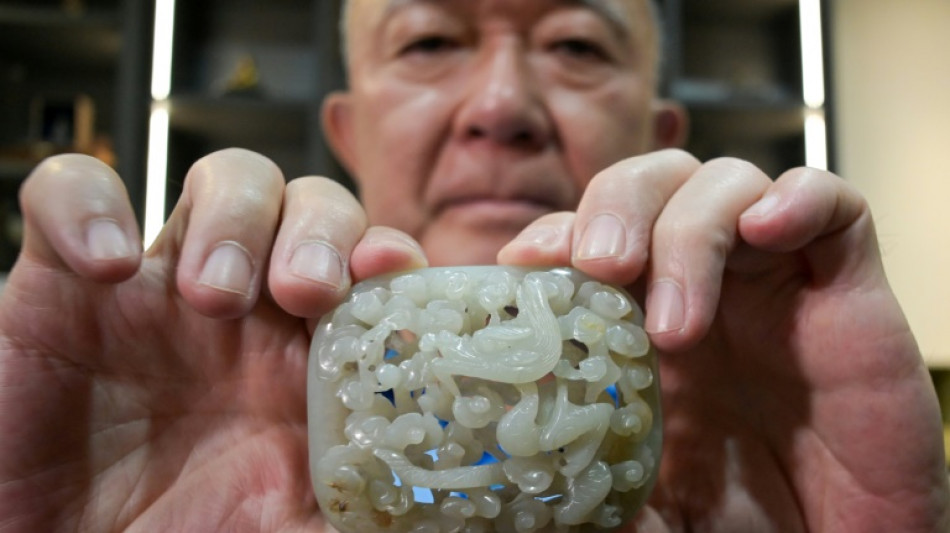
-
 US snowboard star Kim stays on track for historic Olympic hat-trick
US snowboard star Kim stays on track for historic Olympic hat-trick
-
The obstacles to holding war-time elections in Ukraine

-
 History-maker Von Allmen wins third Olympic gold
History-maker Von Allmen wins third Olympic gold
-
Depleted Australia reach 182-6 as skipper Marsh ruled out of Ireland clash

-
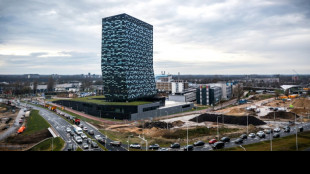 Dutch court orders investigation into China-owned Nexperia
Dutch court orders investigation into China-owned Nexperia
-
US snowboard star Kim stays on track for Olympic hat-trick

-
 Spurs sack Frank after miserable eight-month reign
Spurs sack Frank after miserable eight-month reign
-
Stock markets mixed, dollar dips before US jobs data

-
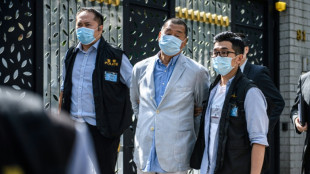 Hong Kong journalists face 'precarious' future after Jimmy Lai jailed
Hong Kong journalists face 'precarious' future after Jimmy Lai jailed
-
French AI firm Mistral to build data centres in Sweden

-
 Frank sacked by Spurs after Newcastle defeat
Frank sacked by Spurs after Newcastle defeat
-
South Africa pip Afghanistan in double super over T20 thriller

-
 Three Ukrainian toddlers, father, killed in Russian drone attack
Three Ukrainian toddlers, father, killed in Russian drone attack
-
Siemens Energy trebles profit as AI boosts power demand

-
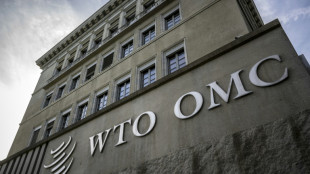 WTO must reform, 'status quo is not an option': chief
WTO must reform, 'status quo is not an option': chief
-
European airlines warn of 'severe disruption' from new border checks

-
 French rape survivor Gisele Pelicot to reveal pain and courage in memoirs
French rape survivor Gisele Pelicot to reveal pain and courage in memoirs
-
EU eyes tighter registration, no-fly zones to tackle drone threats

-
 Shooter kills 9 at Canadian school, residence
Shooter kills 9 at Canadian school, residence
-
Australia captain Marsh out of World Cup opener, Steve Smith to fly in

-
 Spanish PM vows justice, defends rail safety after deadly accidents
Spanish PM vows justice, defends rail safety after deadly accidents
-
Meloni and Merz: EU's new power couple

-
 Veteran Tajik leader's absence raises health questions
Veteran Tajik leader's absence raises health questions
-
EU must 'tear down barriers' to become 'global giant': von der Leyen

-
 Stock markets rise, dollar dips as traders await US jobs
Stock markets rise, dollar dips as traders await US jobs
-
US grand jury rejects bid to indict Democrats over illegal orders video

-
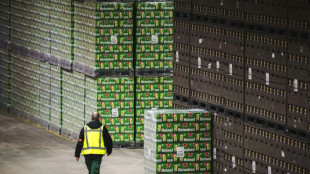 Struggling brewer Heineken to cut up to 6,000 jobs
Struggling brewer Heineken to cut up to 6,000 jobs
-
Asian stock markets rise, dollar dips as traders await US jobs

-
 Britain's Harris Dickinson on John Lennon, directing and news overload
Britain's Harris Dickinson on John Lennon, directing and news overload
-
9 killed in Canada mass shooting that targeted school, residence

-
 Wembanyama scores 40 as Spurs rout Lakers, Pacers stun Knicks
Wembanyama scores 40 as Spurs rout Lakers, Pacers stun Knicks
-
UK's crumbling canals threatened with collapse

-
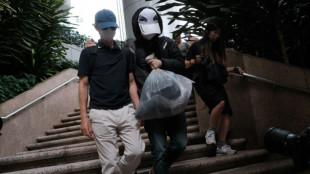 Hong Kong convicts father of wanted activist over handling of funds
Hong Kong convicts father of wanted activist over handling of funds
-
Australia charges two Chinese nationals with foreign interference
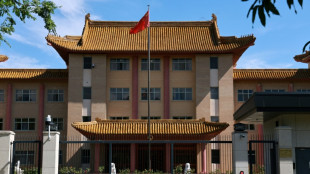
-
 'Overloading' may have led to deadly Philippine ferry sinking
'Overloading' may have led to deadly Philippine ferry sinking
-
Bangladesh to vote on democratic reform charter

-
 China coach warns of 'gap' ahead of Women's Asian Cup title defence
China coach warns of 'gap' ahead of Women's Asian Cup title defence
-
Glitzy Oscar nominees luncheon back one year after LA fires

-
 Pacers outlast Knicks in overtime
Pacers outlast Knicks in overtime
-
9 killed in Canada mass shooting that targeted school, residence: police

-
 De Zerbi leaves Marseille 'by mutual agreement'
De Zerbi leaves Marseille 'by mutual agreement'
-
Netanyahu to push Trump on Iran missiles in White House talks

-
 England captain Stokes has surgery after being hit in face by ball
England captain Stokes has surgery after being hit in face by ball
-
Rennie, Joseph lead running to become next All Blacks coach

-
 Asian stock markets mixed as traders weigh US data, await jobs
Asian stock markets mixed as traders weigh US data, await jobs
-
Australian Olympic snowboarder airlifted to hospital with broken neck

-
 Moderna says US refusing to review mRNA-based flu shot
Moderna says US refusing to review mRNA-based flu shot
-
Instagram boss to testify at social media addiction trial

-
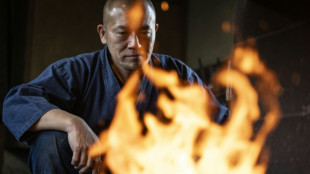 'Artists of steel': Japanese swords forge new fanbase
'Artists of steel': Japanese swords forge new fanbase
-
New York model, carved in a basement, goes on display


Taiwan's antique jade dealers see trade losing lustre
Tracing a palm-sized jade pig resting on its haunches, an antique trader in Taiwan said the ears on the nearly 400-year-old piece are a marker of its authenticity.
"The folds in the pig's ears show the handiwork, the ancient handicraft" of the Ming dynasty (1368-1644), said the 60-year-old trader, who would only provide his last name as Lee.
"It takes very careful carving. If it were duplicates, they wouldn't make it that delicate and detailed."
Lee's shop in Taipei's Da'an district holds ancient treasures worth more than a condominium located in the same neighbourhood.
The value of his merchandise represents just a fraction of an industry that the island's jade association says brought in nearly $16 million annually in recorded pre-pandemic antique jade sales.
But dealers warn the sector is flagging post-Covid. With the global economy in tatters, buyers are more cautious about taking a chance on expensive items, especially with the market awash with counterfeits.
Taipei's worsening ties with Beijing have also meant restrictions are still in place for visitors from mainland China, effectively cutting out the industry's biggest buyers.
Relations have plummeted since Taiwanese President Tsai Ing-wen, who refuses to accept Beijing's claim that the self-ruled island belongs to China, was elected in 2016.
"About seven to 12 years ago, it was very good times for people in Taiwan who are in the antiques or jade trade," said Liu San-bian, who runs a store in Metropolitan Jewelry and Antiques Emporium, a treasure trove of ateliers.
"It declined when cross-strait politics slowly affected travel between both sides," he said, summing up the dilemma in four Chinese characters meaning: "Hard to buy, hard to sell."
"Chinese people stopped coming in and rich people in Taiwan are not buying. There is no supply in the market... and collectors here are not willing to release their items for sale."
- 'Ingrained in our DNA' -
Taiwan was the go-to place for hunters of Chinese relics long before it became a powerhouse for hi-tech semiconductors. Collectors said most were carried out of mainland China during the Cultural Revolution, ending up on the island and nearby Hong Kong.
The Chinese government generally considers the trade of antiques from historical eras to be illegal if they were not passed down through inheritance or bought from authorised venues, such as cultural relic stores.
But there is a grey area in Taiwan, where collectors say they have obtained the items through legitimate means, especially if the items were personal belongings.
"To the Chinese, it is ingrained in our DNA," Chang Juben, chairman of Taiwan's Association of Jade Collectors, told AFP.
"Collectors in Taiwan began collecting when they realised that these were valuable national treasures... Taiwan has a reputation in the Greater Chinese community, that you can come here to see, touch and buy good jades here."
The antique jade market took off around 2011, when Beijing-friendly Ma Ying-jeou was president, bringing in "an endless stream of buyers from China and other countries", Chang said.
Now Taiwan's market is about a quarter of its former annual value -- roughly $9.4 million to $15.7 million in the boom years -- and it is easy to be steered towards inauthentic "artefacts".
"It relies on word of mouth," Chang said. "You have to walk the right path and find the right person."
Most reputable collectors are also "protective" about their stock, refusing to show their best items to a novice who won't appreciate it or to a buyer simply looking to resell for profit.
- 'Build a reputation' -
A two-hour flight to Hong Kong -- a hub for Chinese antiques sold in both sprawling markets and upscale auction houses -- tells a different story.
Pola Antebi, deputy chairman at Christie's auction house in Hong Kong, said she is seeing a trend in which antique collectors are releasing long-cherished collections held for up to five decades.
"We've sold several substantial collections from Taiwan in Hong Kong in recent years, including the notable Chang Wei-Hwa collection of early jades," Antebi told AFP.
That portfolio of jades from the Qin and Han dynasties fetched $9.3 million in November, while three previous auctions of Chang Wei-Hwa's collection brought in $24.7 million from 2019 to 2021.
Taiwan's jade "players" remain confident the trade "will survive no matter what", said the trader Lee.
His unique shop, which houses aquariums of iridescent corals, gets visitors via word of mouth. One trip can turn into several before any transaction is made -- if at all.
"It takes very long to build a reputation, but it is very easy to ruin it. If one item you sell turns out to be fake... that's all it takes to ruin you," he said.
M.AbuKhalil--SF-PST

